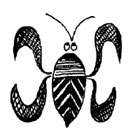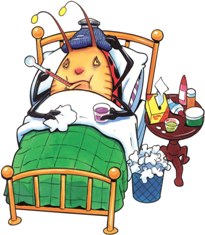Categories: "Animals"
Кошка, часть 2-ая
The generic Russian word for cat is кошка. It declines like this.
| Sg | Pl | |
| Nom | кошка | кошки |
| Acc | кошку | кошек |
| Gen | кошки | |
| Pre | кошке | кошках |
| Dat | кошкам | |
| Ins | кошкой | кошками |
In the US we summon cats with "here, kitty-kitty-kitty." In Russia you summon a cat by saying «кис-кис». In the summer I was at Raifa Monastery and experimented. Sure enough, the cats did *not* respond to the American version, but they immediately responded to the Russian version.
| — Ты любишь кошек? — Люблю. |
“Do you like cats?” “I do.” |
| Кис-кис! Ах, какая ты ласковая! Хочу привезти тебя домой, но мама просто не разрешает. | Here, kitty-kityy! Oh, you are so sweet! I want to take you home, but Mama won't let me. |
| Нашу кошку всегда мучит соседская собака. | The neighbors’ dog is always tormenting our cat. |
| — Где Даша? — Она во дворе играет с кошками. |
“Where is Dasha?” “She's in the courtyard playing with the cats” |
Last summer one of my students was recovering from a laparoscopic procedure in Kazan's Hospital #18. He was horrified to see a cat wandering through the ward. I mentioned that to my friend Flyura, and she just laughed and said,
| В каждой русской больницe есть кошки. Они вообще такие ласковые, что прямо подходят и залазят тебе в сумку. | Every Russian hospital has cats, and they are usually so friendly that they'll just come right up and crawl into your purse. |
Аквариум
My language partner, Alan, and I went to an exhibition of exotic fish at one of the museums on ул. Кремлёвская. That set me thinking about aquariums. The word is fairly straight forward in Russian.
| Sg | Pl | |
| Nom | аквариум | аквариумы |
| Acc | ||
| Gen | аквариума | аквариумов |
| Pre | аквариуме | аквариумах |
| Dat | аквариуму | аквариумам |
| Ins | аквариумом | аквариумами |
Of course the first thing I wanted to do was discuss the difference between fresh-water aquariums and salt-water aquariums, and I translated those phrases word for word into Russian. Wrong. You can't literally say ‘fresh-water aquarium’ in Russian; instead you have to say ‘an aquarium with fresh-water fish’ or ‘an aquarium with salt-water fish.’
| — Я хочу завести аквариум с пресноводными рыбами. — Начни с золотых рыбок. Их тяжело убивать. |
“I want to set up a fresh-water aquarium.” “Start with goldfish. They are hard to kill.” |
| — Я хочу завести аквариум с морскими рыбами. — Это очень сложно, требует много времени и заботы. |
“I want to set up a saltwater aquarium.” “That's very complicated and takes a lot of time and effort.” |
| В моём аквариуме живут тетры и меченосцы. | My aquarium has tetras and swordtails. |
| У нас золотая рыбка выпрыгнула из аквариума и умерла на полу, из-за этого наша дочка весь день ходит в слезах. | Our goldfish jumped out of the aquarium and died on the floor, so our daughter has been walking around crying all day. |
This article would not be complete without mentioning the legendary rock band «Аквариум». Of their music I especially love the song “Rock and roll's dead, but I'm not... yet.” You can listen to it and read the words and translation here.
Корова (часть вторая)
The word for cow in Russian is корова. It declines like this:
| Sg | Pl | |
| Nom | корова | коровы |
| Acc | корову | коров |
| Gen | коровы | |
| Pre | корове | коровах |
| Dat | коровам | |
| Ins | коровой | коровами |
Here are a few sentences...
| Корова больше собаки. | A cow is bigger than a dog. |
| —Сколько у вас коров на даче? — У нас три коровы. Продаём их молоко. |
“How many cows do you have at your dacha?” “We have three cows. We sell their milk.” |
| Я не люблю коров. Они не слушаются, как собаки. | I don't like cows. They aren't as obedient as dogs. |
| В Европе коров едят, а в Индии их почитают. | In Europe they eat cows, and in India they revere them.* |
* Okay, I admit to some plagiarism here. I was having a flashback to Herodotus, who wrote, “How crocodiles are worshipped by some, killed and eaten by by others.”
Животное
The word for animal in Russian is животное. You will notice that it resembles the word живу ‘I live,’ and indeed the root жив- means ‘live.’ In fact in Old Russian the word живот meant life, although nowadays it means stomach. You'll note that животное has a neuter adjectival ending. I suspect that it originally was part of the phrase «животное существо» ‘living being,’ although that's just a guess. In any case, the word is now used as a noun, even though its endings are adjectival, and for that reason we can call it a deadjectival noun. It declines like this:
| Sg | Pl | |
| Nom | животное | животные |
| Acc | животных | |
| Gen | животного | |
| Pre | животном | |
| Dat | животному | животным |
| Ins | животным | животными |
Notice particularly that since the word is neuter, the accusative singular does NOT copy the genitive singular.
| Ты видишь то животное, которое лежит перед оградой? | Do you see that animal that is lying in front of the fence? |
| Какое красивое животное! | What a beautiful animal! |
| Миша любит животных. Он хочет быть ветеринаром. | Michael loves animals. He wants to be a veterinarian. |
| — Что это за животное? — Это утконос. Он интересен тем, что самцы утконоса ядовитые, что нетипично для млекопитающих. |
“What kind of animal is that?” “It's a platypus. It's interesting in that the males are poisonous, which is atypical for mammals.” |
Жук

My favorite letter of the Russian alphabet has always been Ж. When I was younger I called it "the bug letter" because it kind of looks like a bug. Conveniently, it is also the first letter of the Russian word for bug, жук. The plural of our word is, жуки. To be precise, the word means beetle, a type of insect that has hardened wing-coverings:

Жук полетел прямо на меня!
The beetle flew right at me!
If the context does not demand scientific precision, then one might use the word ‘bugs’ in English translation:
Ещё три жука влетели в комнату.
Three bugs flew into the room.
Since I am terrified of bugs, if the above examples were in real life, I would be running out of that room. Especially if the жук were a cockroach. Blech!
The diminutive form of the word is жучок in the singular and жучки in plural. You can use this form if the bug is tiny or if the context is informal. Diminutives of animal words are also often used when talking to children or when children are talking about animals.
Дима смеялся над Машей, потому что она убежала от жучков.
Dima laughed at Masha because she ran away from the bugs.
Это всего лишь маленький жучок!
It's just a little bug!
In American slang we often refer to a minor sickness as a bug; Russians don't do this. So if you say “У меня жук в желудке” to mean “I have a stomach bug,” then Russian people will think that you literally you swallowed a beetle.
